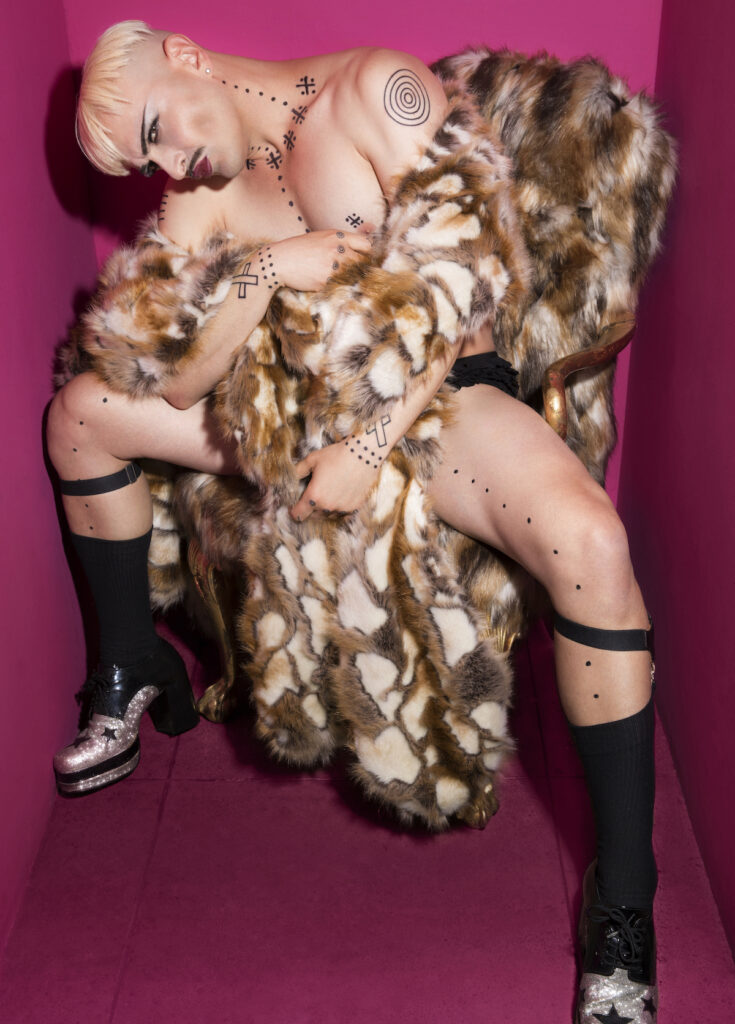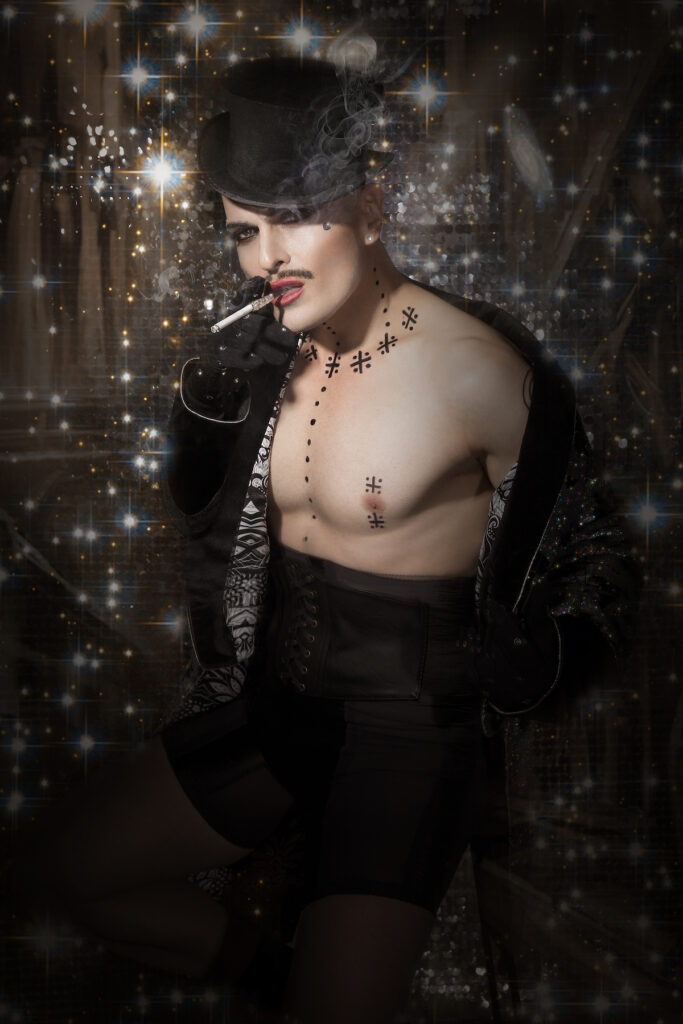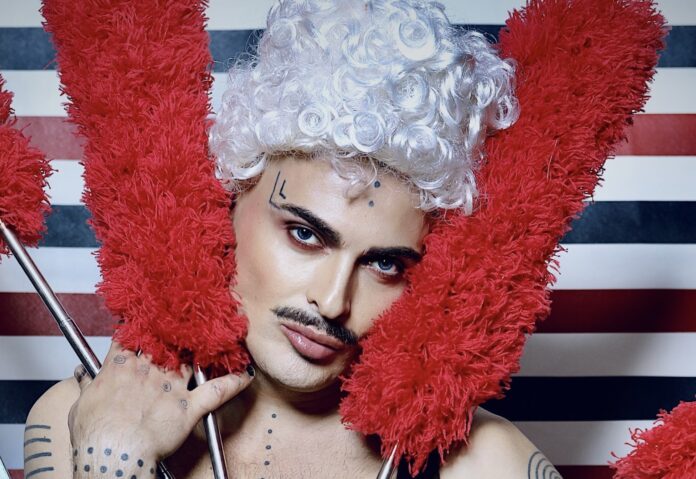Award-winning performance artist and singer-songwriter Ivo Dimchev understands the ups and downs of stardom.
While he’s achieved fame in his native Bulgaria and beyond—racking up over 1 million YouTube views for his most widely known single, 2020’s “BANITSA,” and has been profiled by major publications like Financial Times, The New York Times, and The New Yorker—he’s also been the target of immense homophobia.
Fans see the showmanship of Freddie Mercury and the songcraft of Anohni in Dimchev’s fearlessly queer performance style and innovative multi-genre sound. Detractors see him as someone to ridicule and threaten.
“People who want to put you down don’t believe in your success,” says Dimchev. “Even if you try to say, ‘I’m successful and have been written about in magazines and have been in the best cities in the world, they don’t hear it. For them, you’re always the gay freak who deserves to die. I’m just trying to stand for who I am—and, for me, that’s enough.”
For his much-anticipated Bay Area appearance at Berkeley’s Freight & Salvage (Wed/5), he will debut his new Top Faves show.
Part musical revue, part performance art piece, Top Faves will highlight greatest hits from Dimchev’s past shows—Lili Handel (2004), Some Faves (2009), Selfie Concert (2018), P Project (2012), Facebook Theater (2016), and In Hell with Jesus (2022)— and provide plenty of opportunities for audience interaction.
I spoke to Dimchev about his grand return to San Francisco, why audience participation is always encouraged at his shows, and how the hate continues to motivate him.
48 HILLS This is your second time coming to San Francisco–and this time, you’re bringing your greatest hits with you.
IVO DIMCHEV Yes, I was in San Francisco a few years ago, at the beginning of my singing career, when I had 10 songs in my repertoire. It was wonderful. I came with a keyboard player, I was singing love songs, and everybody was very happy.
The people who came mostly knew me from dance because, in the last 20 years, I was known more in the context of contemporary dance, theater, and performance. But nowadays, I have like 100 songs that I wrote in the last seven years. So my repertoire is going to be much bigger and more fun. My audience has also become more diverse.
48 HILLS What can you tell me about Top Faves? I know it’s a greatest-hits show.
IVO DIMCHEV The show is a mixture of my favorite songs and interactive scenes from different shows. I interact with my audience, sometimes with dramaturgical or performative interactions, and sometimes I ask them questions from my musical In Hell with Jesus, like “Would you rather have sex with Putin or the Dalai Lama?”—and my audience has to vote for one or the other.
I also propose to them different fees for different activities on stage, like getting $60 for a lap dance, $100 for a kissing scene, or $200 for a naked pretend sex scene on a mattress. I will also have different people taking selfies with me on stage while singing like in my Selfie Concert. Usually, it’s a lot of fun.

48 HILLS So many performers want audience members quiet in their seats. Why do you encourage so much interaction?
IVO DIMCHEV Because I like them to be a source of inspiration and my partners in crime. I like to do weird things and don’t want to do them alone. And you never know what you can expect from people. I like to play unsafely and take risks. And people are so diverse and unique. So if somebody comes on stage that has never been on stage, they become even more special, and their uniqueness becomes very obvious. And their uniqueness, combined with my uniqueness, becomes a paradise.
I like having people on stage and interacting with my audience, creating a complexity of experience, which for me is much more valuable than a normal concert and satisfies me as somebody who needs more fun, weirdness, and risk-taking when it comes to art.
48 HILLS You incorporate various genres into your music including chalga. What can you tell me about this Eastern European sound?
IVO DIMCHEV It’s the lowest of the music culture but also the most popular one in Bulgaria. I sometimes like to play with the vibe of this music but in a more ironic way. So all my songs with those elements are very ironic and I would never lock myself aesthetically with this.
As somebody new to making music, it’s important to experiment with different styles to expand my vocabulary as an artist. So when you come to my concert, you can hear a little bit of cello, cabaret, pop music, house music, techno, classical, and-or something very acoustic and mellow. It’s a mixture of styles. But that’s how I am. So I don’t want to hide it or pretend I’m something else.
48 HILLS As an outsider looking in, your biggest hit, “BANITSA,” about the Bulgarian cheese pie, seemed like an experiment that could either rise or fall like the phyllo dough that it’s made of.
IVO DIMCHEV Nobody ever believed that somebody would have a song about banitsa. But when I think about “BANITSA,” I also sing about love, relationships, and expectations between men and women. I like to start with something simple, unexpected, or absurd and then make it very human so that everybody can relate to it. And you can still make people cry with “BANITSA.”
I also have songs about pheromones, vodka, and tripe soup. Most people don’t accept that somebody can impose any value on art based on those subjects. But I believe that even when talking about your socks, you can still create something valuable, deep, and wise.
So the topic itself doesn’t mean anything. The topic is always just a starting point. It’s just a perspective. And at the end of the day, you can stand behind this simple idea and still create a cultural experience that can trigger people on so many levels—consciously and unconsciously.
48 HILLS You’ve been open about this horrifying trauma you experienced being gay bashed by a group of metalheads decades ago. How did that inform the person you are today?
IVO DIMCHEV I learned from a very young age that if I want to be who I am, there’s a price. And sometimes this price is very high. So from a very young age, I was paying the price of being who I am and standing for who I am. So this is what made me more unapologetic as an artist and more or less able to make compromises with my work and find a way, even if I’m playing with taboos and what’s not acceptable in any cultural zone.
I have to be careful and friendly, though, to seduce people into something that is outside their comfort zone. If I do not do this, I have to pay the price of people leaving the theater, or when I was a child, just beating me up or kicking me out of school just because I’m too much. So I learned to be too much and still be liked or have something that can trigger interest and keep their focus on me and with me through this strange journey I’m taking them on.
So this clash I had between my reality and the reality of my surroundings just made me stronger or more wedded to my ideas. Or probably more self-critical because I’m able to take criticism and learn from the hate or resistance I have in society or on social media.
48 HILLS Tell me more about that.
IVO DIMCHEV When I appear on social media or in a public space, the reactions of homophobic people are very strong, especially in Bulgaria.
Lately, I have had a lot of death threats in Bulgaria. People on social media want to kill me. I have learned to accept this and even respect this somehow because this is how the world functions. If you are who you are, you get death threats.
So sometimes I make jokes with them. I enter weird, funny conversations with those people, which they would not expect. But I learned to take these things not so literally and just deal with this aggression with understanding. You do not deal with this aggression with aggression or with judging them because you cannot change anything that way.

48 HILLS At the same time, you’ve become one of the most popular artists in Bulgaria, and I know that this tour is even sponsored by the National Culture Fund of Bulgaria. So you have found some acceptance.
IVO DIMCHEV For sure. I have had support for two, three years from the National Culture Fund. I have an intelligent audience, too. In my life, I performed for a very elitist contemporary dance and theater audience. When I started making music, I gained an audience of people who never go to a theater and just like to listen to music.
So I’m happy that I took this turn in my career by playing with an art form, which is easy to understand and relate to. And because I do my shows like Top Faves, Selfie Concert, or In Hell with Jesus, I start to pull this very conventional audience into the theater so they can experience something new.
IVO DIMCHEV: TOP FAVES Wed/5, Freight & Salvage, Berkeley. $15-$34. Tickets and more info here.







